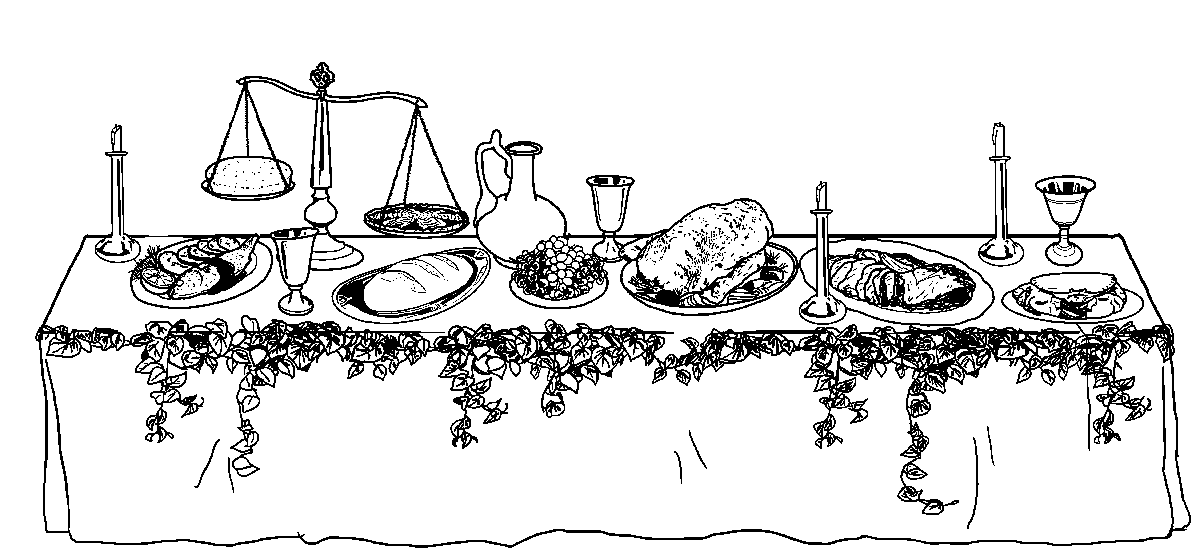A Millionaire’s Dinner

Illustration by Claire McCracken
Immediately glass wine jars were brought in, carefully sealed with plaster, and on their necks there were little tags with this legend: “Falernian Opimian, one hundred years old.” While we were reading the tags, Trimalchio clapped his hands, and presently began to hold forth:
“Oh, dear, see how much longer-lived wine is than any poor mortal! Let’s drink, then, and make merry, for wine is really life. Just look; here’s genuine old Opimian. I didn’t put nearly such good liquor as this on the table yesterday, and yet the people who dined with me then were socially very much superior to you.”
As we were drinking the wine, and noting very carefully all his evidences of good taste, a slave brought him a silver skeleton ingeniously put together so that its limbs could be thrown out of joint and made to turn in any direction. This Trimalchio kept throwing again and again upon the table and making it assume all sorts of shapes, until at last he observed: “Alas and alack! What a nothing is man!
We all shall be bones at the end of life’s span:
So let us be jolly as long as we can.’’
We were still complimenting him on his philosophy, when a course was served whose peculiarity attracted everyone’s attention; for a double tray in which it was set had the 12 signs of the Zodiac arranged in a circle and over each sign the chief butler had arranged some kind of food that was appropriate to it—over the Ram, some chickpeas with tendrils that curled like a ram’s horns; over the Bull, a bit of beef; over the Twins, a pair of lamb’s fries and kidneys; over the Crab, a garland; over the Lion, an African fig; over the Virgin, a sow’s paunch; over the Balance, a pair of scales on one of which was placed a tart and on the other a cake; over the Scorpion, a crab; over Aquarius, a goose; over the Fish, two mullets. In the middle was a piece of fresh turf supporting a honeycomb. An Egyptian slave passed us some bread in a silver bread plate, while Trimalchio croaked out a popular song from the musical farce called The Garlic Eater.
We were making ready to attack these absurd viands, though with no great eagerness, when Trimalchio remarked:
“Come, let’s dine. This is really the very sauce of the dinner.”
As he said this, four slaves came forward with a solemn dance-step to the sound of music and took off the cover from the upper part of the tray. As soon as they had done this we saw, underneath the cover, capons and sows’ breasts, and a hare with feathers stuck in its back so as to represent Pegasus. We observed also in the corner of the tray a figure of Marsyas, holding a wine skin from which highly peppered fish sauce flowed out over the fish, which swam in it as though they were in a brook. The slaves began to applaud, and we all joined in vigorously, laughing as we fell to, over these choice dainties. Trimalchio, equally delighted at this culinary surprise, called out, “Carver!” and at once a man provided with a knife and making elaborate gestures in time to the music, hacked up the meat in such a fashion that you would have imagined him to be a chariot fighter slashing about to the sound of a water organ. Trimalchio in a drawling tone kept up his exclamation, “Carver! Carver!” so that suspecting the repetition of this word to have some humorous intention, I did not hesitate to question the guest who sat beside me. He was quite familiar with the whole thing, and explained it by saying:
“Do you see the man who has carved the meat? His name is Carver. And so, as often as Trimalchio says, ‘Carve her!’ He calls the slave by name and at the same time tells him what to do.”
I was unable to eat another mouthful; and so, turning to my companion, I tried to draw as much information out of him as possible, and to get the run of the gossip of the house, asking, in the first place, who the woman was who was darting here and there about the room.
“Oh,” said he, “that’s Trimalchio’s wife. Her name is Fortunata. She has money to burn now, but a little while ago what do you suppose she was? Your honor will excuse me for saying so, but really in those days you wouldn’t have taken a piece of bread from her hand. And now, without any why or wherefore, she’s at the top notch and is all the world to Trimalchio—in fact, if she should say it was night at noonday, he’d believe her. As for Trimalchio himself, he’s so rich that he doesn’t know how much money he’s got; but this jade has an eye to everything, even the things that you wouldn’t think about yourself. She doesn’t drink, she’s as straight as a string—in fact, a really smart woman; but she has an awfully sharp tongue, a regular magpie on a perch. If she likes anyone, she likes him way down to the ground, and if she doesn’t like him, she just hates him! Trimalchio’s estates are so large that it would tire a bird to fly over them, and he has heaps on heaps of cash. Take his silver plate, for instance. Why, there’s more of it in his janitor’s office than most persons have in their entire outfit; and his slaves—well, sir, they’re so numerous that I don’t think a tenth part of them would recognize their own master. In fact, when it comes to money he can buy up any of these chumps here 10 times over; and there’s no reason for his paying out money for anything at all, because he produces everything on his own place—wool and cedar wood and pepper—why, if you were to ask for hens’ milk, you’d get it. To give you an instance…because he wanted to have Athenian honey right here on his estate, he imported bees from Athens, and incidentally these improved the breed of the native bees also. Only a few days ago he wrote and ordered mushroom seed to be sent him from India…. That’s what I call being rich.


